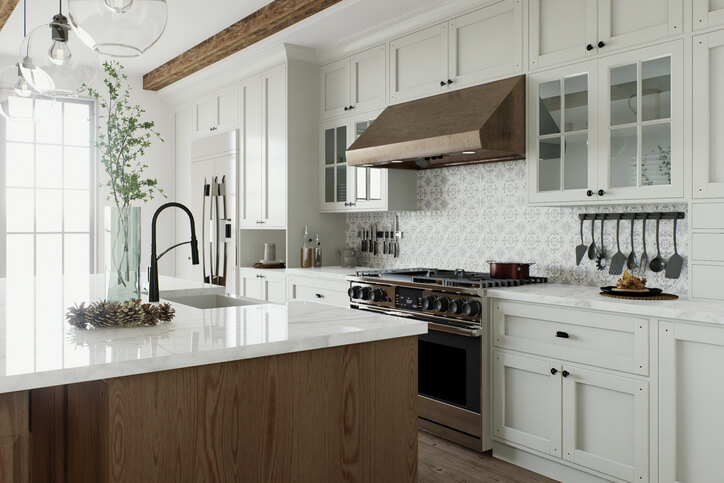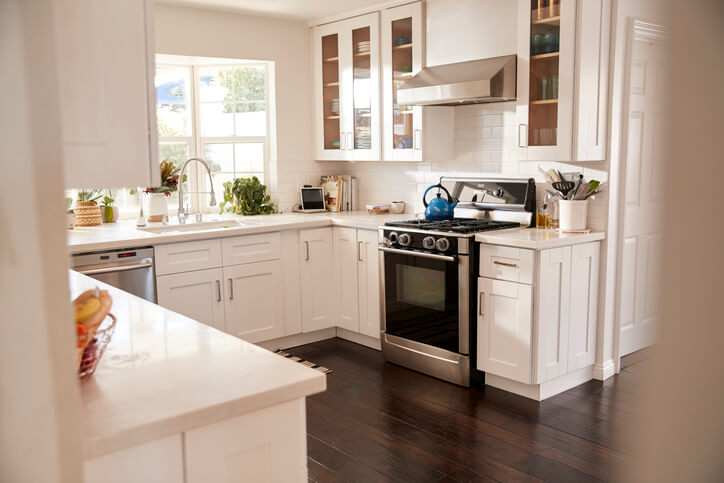Can you renovate a kitchen in a couple of days, weeks, or months? Let’s find out.

Renovating a kitchen doesn’t have to be a long, lengthy process. It can take days, weeks, or months depending on what you do. Discover how long a kitchen renovation takes and how to speed up the process.
How Long Does It Take to Renovate a Kitchen?
Renovating a kitchen can take a couple of weeks or several months. Smaller projects can be done in 2-3 weeks, while bigger renovations can take 4-5 months. These figures relate to the time it takes to actually rip out and fit a new kitchen. The entire process is much longer when you consider all the planning that takes place beforehand.
For example, designing the kitchen, getting quotes, ordering the units, waiting for delivery, hiring a skip, booking time with a kitchen fitter, etc. can take weeks or months before the actual refit takes place. Relying on professionals to fit the kitchen also impacts how long your renovation takes. Such as, if you need to hire an electrician, plumber, or plasterer as well as a fitter.
How Long Should Ripping Out a Kitchen Take?
Ripping out a kitchen should only take a couple of days. It’s the quickest part of the process and the first step, once all the planning has taken place. Depending on the kitchen, it can take longer, but usually it’s no more than a week. For example, if flooring and wall tiles need to be removed, this can take longer than if you have splashback panels or you’re keeping the existing floor.
Can You Speed Up a Kitchen Refurb? 5 Top Tips

Speed up your kitchen renovation with these top tips:
1. Keep the Same Layout
Keep costs low and timescales shorter by maintaining the same layout in your kitchen. The most important things to keep in the same place include sinks, ovens, and gas hobs. Fridges, freezers, and cupboards can easily be moved around without impacting the cost or timescales as much. Bigger changes, like knocking down walls, moving windows, or changing patio doors, will also take longer.
2. Use the Same Countertops
Most countertops can be removed from the current cabinetry and reused, particularly granite or marble worktops. Usually, keeping the countertops the same can lead to a faster installation, as there’s less work for the fitter. Plus, some worktops, like solid wood, granite, marble, or concrete are better fit by a specialist countertop fitter. This can add days to the installation process.
3. Paint, Don’t Replace
The fastest way to refurb a kitchen is to spruce it up, rather than ripping it out and replacing everything brand new. Consider painting the walls, ceiling, countertops, units, or even the floor tiles to quickly give the kitchen a new lease of life. When selling a property, smaller changes to modernise a kitchen can be more financially worthwhile than redoing it entirely. Get an accurate online valuation to see how much your property is worth as is.
4. DIY Where Possible
A huge part of the kitchen renovation process relies on booking time with professionals to complete the job. When asking a fitter to remove the kitchen, repaint, and replace the flooring, this can take longer than if you complete the work yourself. Consider where you can DIY a kitchen remodel to speed things up while also lowering costs.
5. Plan Ahead
Delays can always happen during any home renovation project. Most delays are avoidable with proper planning. For example, by checking whether you need a permit to hire a skip before completing the rip out. Ask an experienced kitchen fitter or designer for advice on what your project may need and how to plan ahead.
Conclusion
Kitchen renovations can be well worthwhile when you want to sell in the near future. Yet major changes aren’t just time-consuming, they’re also costly and maybe not even necessary to boost resale value.
Before embarking on your home renovation project, consider booking an estate agent valuation with our expert team. Or get an instant online valuation using real-time data of the properties in your area.